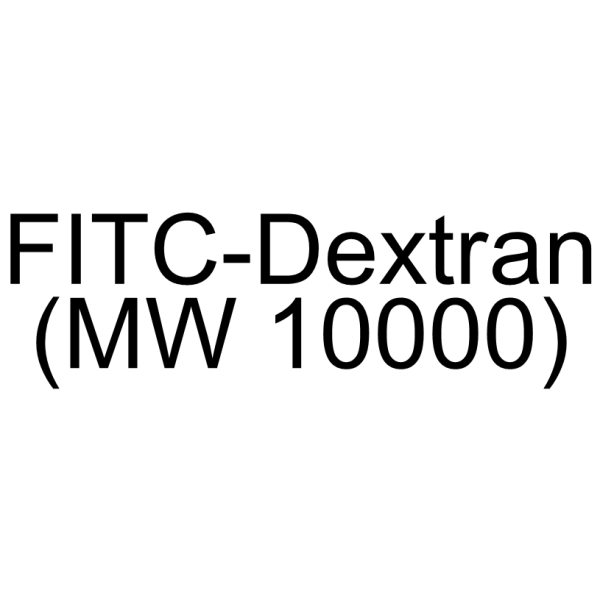Shopping Cart
- Remove All
 Your shopping cart is currently empty
Your shopping cart is currently empty

FITC-Dextran (MW 10000) is a marker (10 kDa) formed by coupling FITC to dextran. FITC-Dextran is a labeled polysaccharide composed of branched glucose molecules of various lengths, enabling the determination of solute, ionic, and protein permeability of the blood-brain barrier depending on the size of the dextran used.

| Pack Size | Price | Availability | Quantity |
|---|---|---|---|
| 5 mg | $32 | In Stock | |
| 10 mg | $53 | In Stock | |
| 25 mg | $83 | In Stock | |
| 50 mg | Inquiry | In Stock |
| Description | FITC-Dextran (MW 10000) is a marker (10 kDa) formed by coupling FITC to dextran. FITC-Dextran is a labeled polysaccharide composed of branched glucose molecules of various lengths, enabling the determination of solute, ionic, and protein permeability of the blood-brain barrier depending on the size of the dextran used. |
| In vitro | METHODS: FITC-dextran assay for RBL-2H3 mast cell line: 1. Mix 1 mg of FITC-dextran powder per 1 mL of medium. Use a cellulose acetate syringe filter with a pore size of 0.22 µm to filter the dissolved FITC-dextran. 2. Add 10 µL of cell suspension to a chamber coverslip pre-filled with fresh FITC-dextran supplemented medium. 3. Incubate RBL cells overnight at 37°C in a humidified environment with 5% CO2. Cells should be maintained at a subfusion level to ensure cell separation and that each cell can be easily identified individually under a microscope. 4. Wash the chamber coverslips three times by aspirating the medium from the chamber and refilling with 300 µL of Tyrode Buffer preheated to 37°C. The coverslips should be cleaned with the Tyrode Buffer. Finally, replenish the chamber with 300 µL of Tyrode Buffer preheated to 37°C. 5. Select the region of interest to be tracked by turning on the fluorescent light source and selecting an appropriate fluorescent filter, choose a filter with green fluorophores to view FITC-dextran. if using a laser-based microscope, turn on the 488 nm laser, the emission should be centered around 500-550 nm. [1] |
| In vivo | METHODS: Intestinal permeability was determined by FITC-dextran: 1. FITC-dextran was dissolved in sterilized PBS at a concentration of 80 mg/mL. 2. Mice were fasted for 4 h prior to FITC-dextran injection, followed by oral administration of 100 µL of FITC-dextran. 3. After 4 h, mouse blood is collected and centrifuged at 4000 rpm for 15 min. Plasma samples are collected in clear EP tubes and placed at 4°C, protected from light. 4. Standard FITC-dextran samples were diluted to 0-100 µg/mL with PBS and transferred to a black 96-well plate. 5. Measure the fluorescence at 485 nm excitation wavelength and 528 nm emission wavelength using a microplate reader. [2] |
| Alias | FITC-Dextran |
| Molecular Weight | 10000 |
| Cas No. | 60842-46-8 |
| Relative Density. | no data available |
| Storage | store at low temperature | Powder: -20°C for 3 years | In solvent: -80°C for 1 year | Shipping with blue ice. | |||||||||||||||
| Solubility Information | H2O: 50 mg/mL (5 mM), Sonication is recommended. | |||||||||||||||
Solution Preparation Table | ||||||||||||||||
H2O
| ||||||||||||||||

Copyright © 2015-2025 TargetMol Chemicals Inc. All Rights Reserved.